
The greater they press phantom “assets” based upon rapid increases in utilize, the greater the air gap between important tangibles and fantasy.
Inflation is in the news, but there are a couple of things about inflation that don’t get much protection. Let’s begin with the trope that inflation is constantly a monetary phenomenon. Actually, no.
When nutrient-rich soil and fresh water reserves are diminished, crop yields decline and as human population and appetites for animal protein skyrocket, food becomes limited. When food ends up being limited, costs increase accordingly. It doesn’t matter what you make with money supply, costs will increase in relation to whatever used as “cash:” gold, shells, paper with colorful pictures printed on it, huge stone disks, quatloos, cryptocurrencies, and so on
. You could eliminate “cash” totally and the relative expense of food would rise even in a barter-only system.
What few seem to understand is that there is a hierarchy of requirements that ruthlessly separates “requirements” from “desires,” and the value of “wants” rapidly drops to zero in genuine shortages. When you’re hungry, I indicate really starving, the value of your yacht, collectible muscle car, NFT, etc. falls to absolutely no if those with food have zero interest in your “valuables.” An ounce of gold for an egg? All of it depends upon what’s really a requirement.
In a similar fashion, real scarcity separates phantom intangible possessions from genuine assets. If you glimpse at the chart of concrete and intangible properties below, you’ll keep in mind that phantom intangible assets are now the frustrating bulk of what’s laughably called “properties.”
You want to trade your shares in XYZ Corporation for a 50-pound bag of rice? How do I know the “value” of shares in XYZ Corporation will not be no tomorrow? No, thank you. Return when you have something concrete and tangibly useful (i.e. it will hold its value tomorrow) to trade for the rice.
We live in a dream world in which scarcity has actually been gotten rid of by the gods of globalized markets and phantom possessions constructed on sandcastles of take advantage of are the most valuable assets on the planet. Worldwide stocks are now worth $115 trillion, woo-hoo.
On the other hand, back in the real world, the huge bulk of mankind trades their labor for food and other fundamentals. The amusing thing about human labor is that thanks to population growth, globalization and financialization, the relative worth of labor has been in decline for decades. (see chart listed below) This implies that as costs of fundamentals rise due to deficiencies, the quantities of tangibles that labor can purchase decrease, meaning those trading their labor for essentials can afford less basics.
To put it simply, their prosperity is in a free-fall as scarcities push up costs of basics.
This free-fall of labor’s worth and thus of success is visible in the RAND chart of income 1975-2018 and in the Federal Reserve database chart of the wealth held by the bottom 50% of American families. The RAND chart of income by the top 1%, top 9% and bottom 90% reveals that 25% of the bottom 90%’s earnings– essentially all from labor– has actually been transferred to the leading 1% (the share of gross income going to the top 1% rose 2.5-fold) and to a lesser degree, to the leading 9%. (Remember that the leading 9% mainly rely on profits from labor, thus their modest increase compared to the top 1%.)
The pathetically thin slice of wealth held by the bottom 50% of American homes has fallen to near-zero. It’s fallen by 2/3 because the recent peak in the mid-1990s, the last “boom” that dripped down to the bottom 90%.
The bottom 50% have no reserves to draw upon as prices of tangible essentials increase. They have no wealth to offer, and the worth of their labor as determined in acquiring power of essentials remains in a speeding up decrease.
This is a longstanding reality of civilization. As performance increases, the human population broadens up to the carrying capability of the biosphere. Labor’s incomes rise as manufacturers expand production to meet rising demand. Human population and cravings for goodies keep broadening, overshooting sustainable supply while labor broadens to the point that it is in oversupply. Salaries decrease and labor thus loses buying power simply as prices of fundamentals soar. Discontent and condition boost and states and civilizations fall.
I have actually long suggested these books on the fundamental cycle of civilization:
The Great Wave: Rate Revolutions and the Rhythm of History
This leads us to the last chart of decreasing returns on the phantom fixes of monetary control and bread and circuses totally free cash. The Federal Reserve can create currency out of thin air however it can’t create efficient land, fresh water, copper ore, oil, or food.
The Fed can create phantom “wealth” based upon leverage however this relies on a heavily hyped faith in a fantasy world in which all tangible scarcities are magically turned to abundance by reserve bank cash production and low interest rates, and a splash of technocrat pixie dust: carbon taxes, windmills and drones sweeping about.
The returns on dreams and phantom “possessions” are likewise in a free-fall. Monetary and fiscal stimulus is increasing to keep the travesty of a mockery of a sham “prosperity” from collapsing into a putrid sinkhole of unsuccessful financial farce.
The higher they push phantom “possessions” based upon exponential increases in utilize, the higher the air space in between essential tangibles and dream.
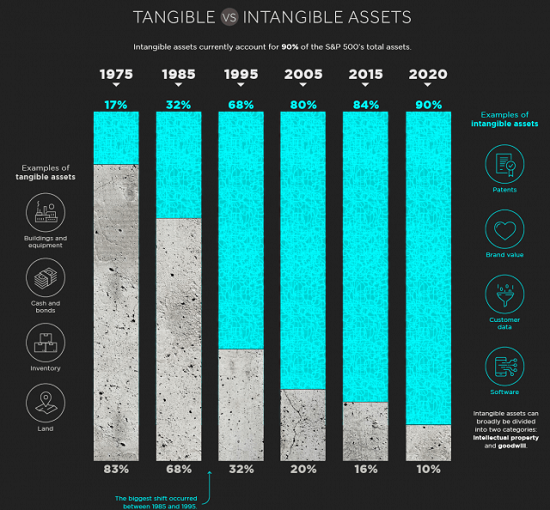
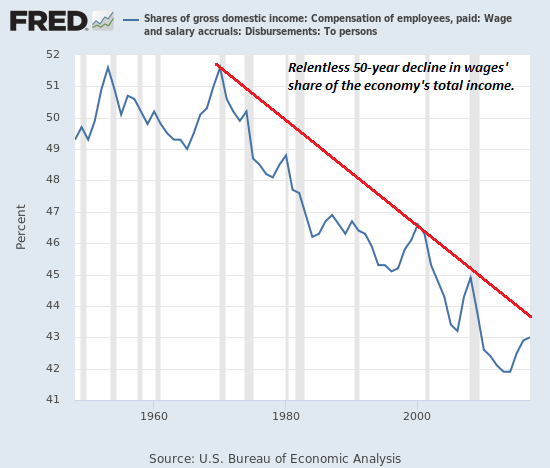
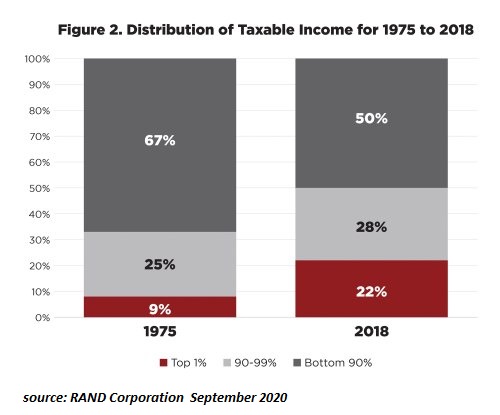
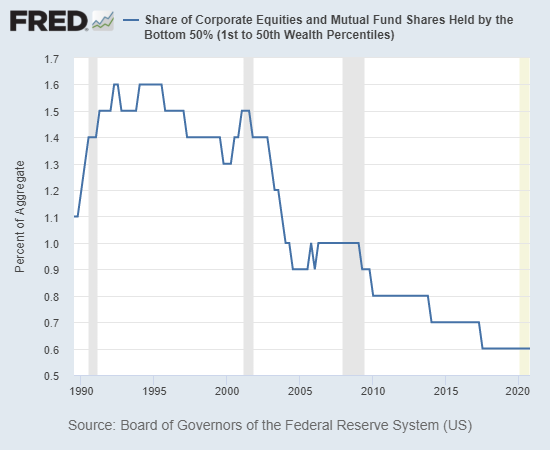
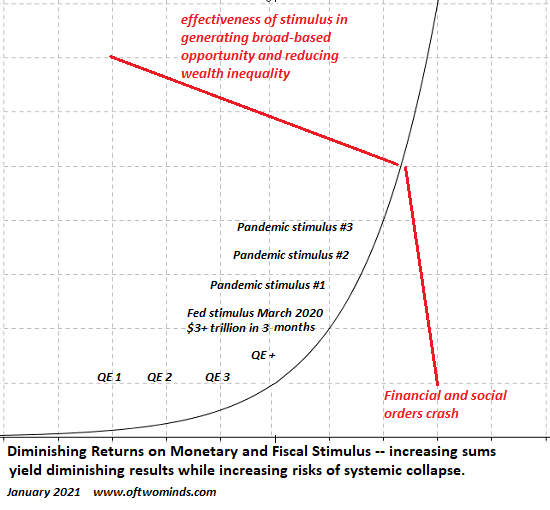
< img align ="center"src=" https://www.oftwominds.com/photos2021/wages-share-income7-19a.png "/ > If you discovered value in this material, please join me in seeking services by ending up being a $1/month patron of my work via patreon.com.
My new book is available! A Hacker’s Teleology: Sharing the Wealth of Our Diminishing Planet 20% and 15% discount rates (Kindle $7, print $17, audiobook now readily available $17.46)
Read excerpts of the book free of charge (PDF).
The Story Behind the Book and the Introduction.
Recent Podcasts:
Charles Hugh Smith on the Era of Speeding Up Expropriations (38 minutes) (FRA Roundtable Insight)
Covid Has Actually Triggered The Next Great Financial Crisis (34:46)
My recent books:
A Hacker’s Teleology: Sharing the Wealth of Our Shrinking Planet (Kindle $8.95, print $20, audiobook $17.46) Read the first section for free (PDF).
Will You Be Richer or Poorer?: Earnings, Power, and AI in a Shocked World
(Kindle $5, print $10, audiobook) Read the first area totally free (PDF).
Pathfinding our Fate: Preventing the Final Fall of Our Democratic Republic ($5 (Kindle), $10 (print), ( audiobook): Check out the first section totally free (PDF).
The Adventures of the Consulting Thinker: The Disappearance of Drake $1.29 (Kindle), $8.95 (print); checked out the first chapters for free (PDF)
Money and Work Unchained $6.95 (Kindle), $15 (print) Read the very first section for free (PDF).
Become a $1/month client of my work via patreon.com.
KEEP IN MIND: Contributions/subscriptions are acknowledged in the order received. Your name and email remain personal and will not be offered to any other individual, business or company.
|
Thank you, James Michael S. ($200), for your beyond-outrageously generous contribution to this site– I am significantly honored by your unfaltering support and readership. |
Thank you |
, Oliver M. ($5/month), for your splendidly generous membership to this website– I am considerably honored by your support and readership. |

